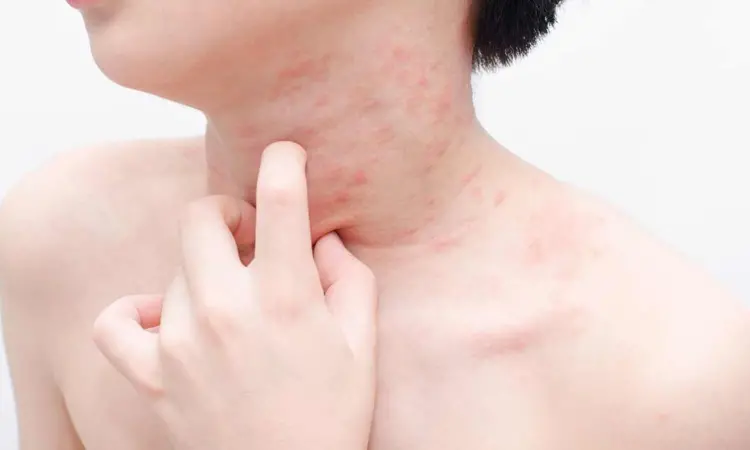- Home
- Medical news & Guidelines
- Anesthesiology
- Cardiology and CTVS
- Critical Care
- Dentistry
- Dermatology
- Diabetes and Endocrinology
- ENT
- Gastroenterology
- Medicine
- Nephrology
- Neurology
- Obstretics-Gynaecology
- Oncology
- Ophthalmology
- Orthopaedics
- Pediatrics-Neonatology
- Psychiatry
- Pulmonology
- Radiology
- Surgery
- Urology
- Laboratory Medicine
- Diet
- Nursing
- Paramedical
- Physiotherapy
- Health news
- Fact Check
- Bone Health Fact Check
- Brain Health Fact Check
- Cancer Related Fact Check
- Child Care Fact Check
- Dental and oral health fact check
- Diabetes and metabolic health fact check
- Diet and Nutrition Fact Check
- Eye and ENT Care Fact Check
- Fitness fact check
- Gut health fact check
- Heart health fact check
- Kidney health fact check
- Medical education fact check
- Men's health fact check
- Respiratory fact check
- Skin and hair care fact check
- Vaccine and Immunization fact check
- Women's health fact check
- AYUSH
- State News
- Andaman and Nicobar Islands
- Andhra Pradesh
- Arunachal Pradesh
- Assam
- Bihar
- Chandigarh
- Chattisgarh
- Dadra and Nagar Haveli
- Daman and Diu
- Delhi
- Goa
- Gujarat
- Haryana
- Himachal Pradesh
- Jammu & Kashmir
- Jharkhand
- Karnataka
- Kerala
- Ladakh
- Lakshadweep
- Madhya Pradesh
- Maharashtra
- Manipur
- Meghalaya
- Mizoram
- Nagaland
- Odisha
- Puducherry
- Punjab
- Rajasthan
- Sikkim
- Tamil Nadu
- Telangana
- Tripura
- Uttar Pradesh
- Uttrakhand
- West Bengal
- Medical Education
- Industry
Effective therapy for chronic spontaneous urticaria may lower mortality: Study

A new study published in the Journal of Allergy and Clinical Immunology showed that effective therapy for chronic spontaneous urticaria (CSU) may lower mortality. Between 0.5% and 1% of people have chronic spontaneous urticaria which is a prevalent immunologic condition. It is linked to several negative patient outcomes, both direct and indirect that ranged from a decline in quality of life (QoL) to a rise in allergy misdiagnosis and mislabeling.
Complete disease control is the aim of treatment for CSU, and stepwise pharmacologic therapy is advised by recommendations. Omalizumab (licensed dose 300 mg monthly) is recommended for patients with uncontrolled symptoms even after receiving maximal doses of antihistamines (approximately 20% to 50% of all patients with CSU).
This is despite the fact that the first step is the regular use of second-generation H1-antihistamines, followed by doses increasing up to 4-fold. Therefore, this study was conducted to evaluate the influence of treatment recommendations for urticaria on mortality rates, risk for comorbidities that are major causes of death, and all-cause mortality in CSU patients.
The electronic medical data of 1,27,28,913 non-urticaria controls and 2,72,190 adult CSU patients from the US Collaborative TriNetx Analytics Network are the subjects of this retrospective population-based cohort research. A total of 2,64,680 propensity score-matched people suffering from CSU and an equal number of non-urticaria controls were included in the research.
The patients with CSU had greater 3-month, 1-year, and 5-year all-cause mortality. CSU patients had greater risk and incidence of the top causes of mortality in the US, such as malignant neoplasms and suicidal thoughts and attempts, than non-CSU controls.
White and younger patients seemed to be at a higher risk of death at CSU. When compared to patients who were not treated, CSU patients treated with second-generation H1-antihistamines had significantly reduced all-cause death rates at 5 years, as were patients treated with omalizumab as opposed to those treated with antihistamines.
Overall, chronic spontaneous urticaria patients had a 1.7-fold higher risk of all-cause death than the individuals without CSU. Mortality rates were reduced by CSU therapy with omalizumab and second-generation antihistamines by indicating that these risks might be reduced with appropriate care.
Source:
Kolkhir, P., Bieber, K., Hawro, T., Kridin, K., Ludwig, M. A., Olbrich, H., Metz, M., Vorobyev, A., Ludwig, R. J., & Maurer, M. (2024). Mortality in adult patients with chronic spontaneous urticaria: A real world cohort study. In Journal of Allergy and Clinical Immunology. Elsevier BV. https://doi.org/10.1016/j.jaci.2024.11.036
Neuroscience Masters graduate
Jacinthlyn Sylvia, a Neuroscience Master's graduate from Chennai has worked extensively in deciphering the neurobiology of cognition and motor control in aging. She also has spread-out exposure to Neurosurgery from her Bachelor’s. She is currently involved in active Neuro-Oncology research. She is an upcoming neuroscientist with a fiery passion for writing. Her news cover at Medical Dialogues feature recent discoveries and updates from the healthcare and biomedical research fields. She can be reached at editorial@medicaldialogues.in
Dr Kamal Kant Kohli-MBBS, DTCD- a chest specialist with more than 30 years of practice and a flair for writing clinical articles, Dr Kamal Kant Kohli joined Medical Dialogues as a Chief Editor of Medical News. Besides writing articles, as an editor, he proofreads and verifies all the medical content published on Medical Dialogues including those coming from journals, studies,medical conferences,guidelines etc. Email: drkohli@medicaldialogues.in. Contact no. 011-43720751


